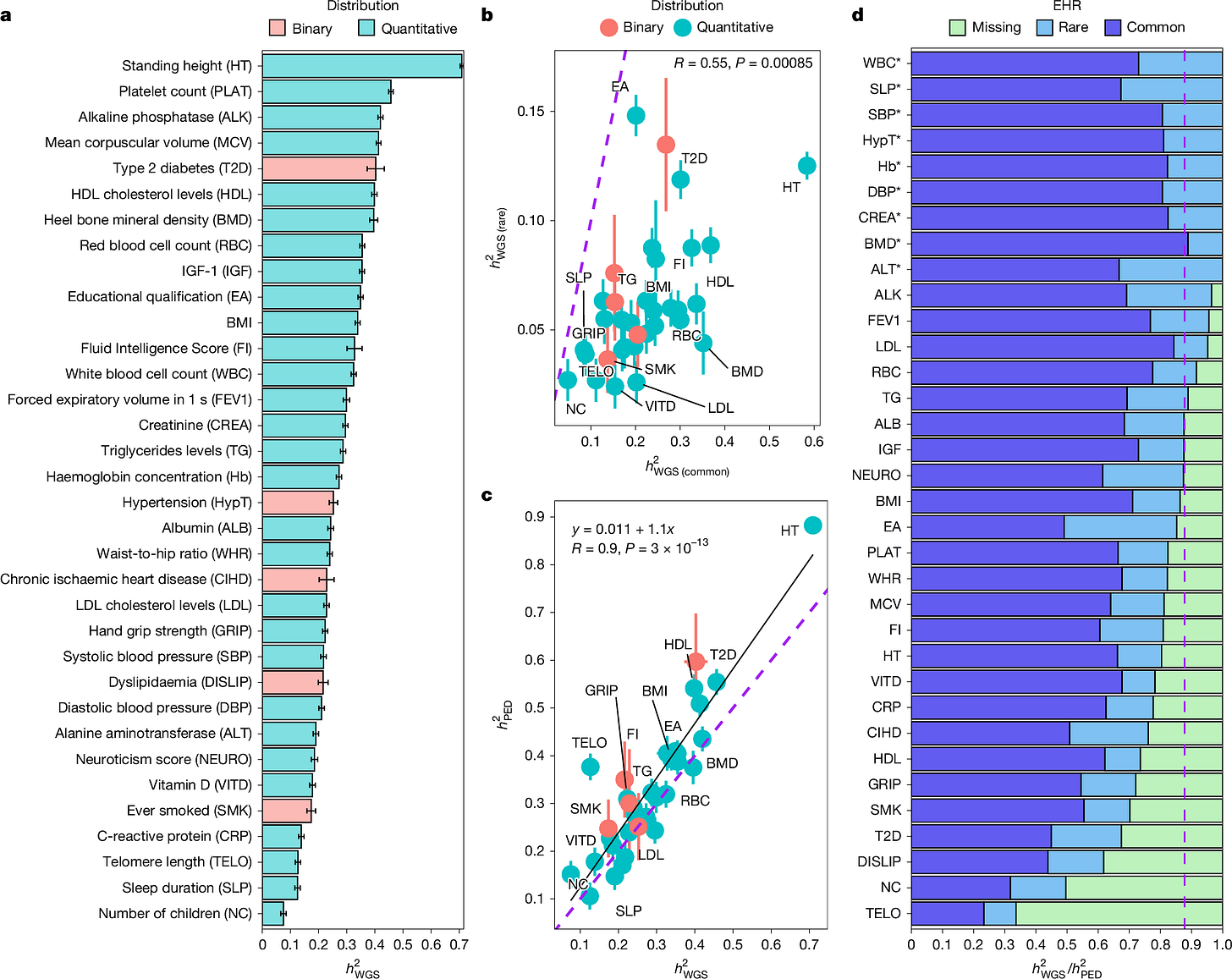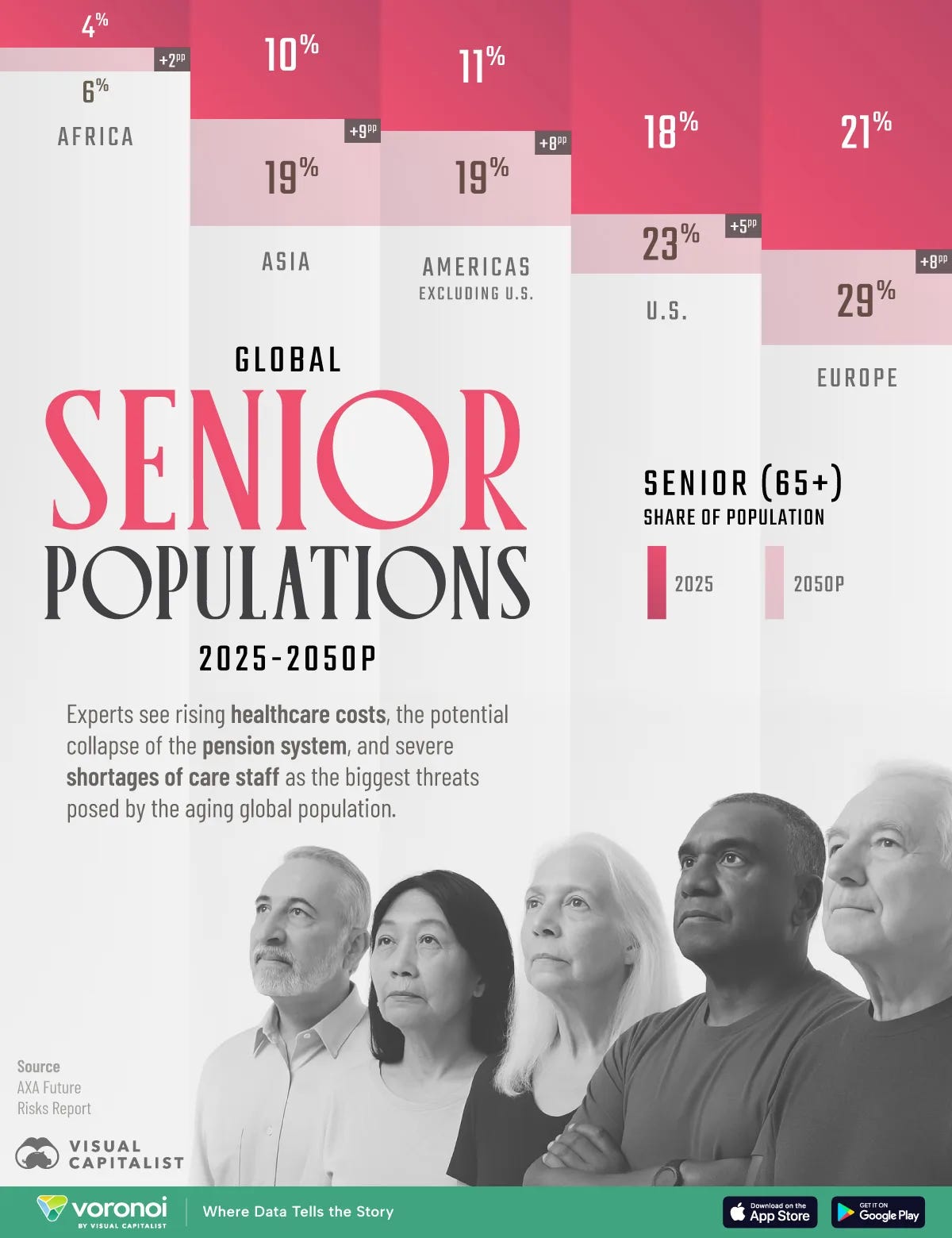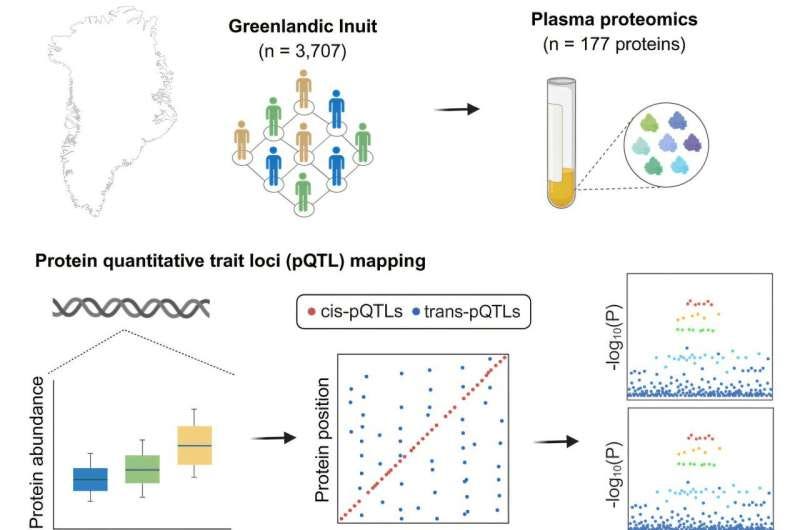Repronews #77: Nucleus Genomics NYC ads urge customers to “have your best baby”
No adverse events >99% UK fertility treatments | “Fertility abundance agenda” in NYT | Missing heritability identified | Male/female gene activity in brain | East Asian genetics | Greenlander genetics
Welcome to the latest issue of Repronews! Highlights from this week’s edition:
Repro/genetics
“IQ is 50% genetic,” “Have your best baby”: Nucleus Genomics posts embryo selection ads in New York City.
Report: Adverse events occur in less than 1% of UK fertility treatments.
Population Policies & Trends
Ruxandra Teslo in the New York Times calls for a “fertility abundance agenda” broadening access to IVF and other fertility services to expand women’s reproductive choices and increase population growth.
Genetic Studies
Major Nature study finds genetic influence accounting for most known heritability for height, fluid intelligence, and other traits.
Jenny Graves writes on differential genetic activity in male and female human brains.
Massive Taiwanese study discovers genes associated with diabetes, heart disease, and other conditions among East Asians.
Study of Greenlanders finds ancient Arctic adaptations may influence modern disease risk.
Further Learning
Phoebe Arslanagić-Little discusses birth rate decline and pronatal measures on the Looking for Growth podcast.
Repro/genetics
“IVF ads urge you to ‘have your best baby’ through genetic optimization” (Ad Age)
Embryo selection startup Nucleus Genomics has taken ads in New York City with headlines such as “Have your best baby,” “Have a healthier baby” and “IQ is 50% genetic.”
The ads point to the campaign side pickyourbaby.com with links to genetic testing services either to “Preview” one’s baby or to select embryos as “IVF+.” Preview probabilistically predicts the baby’s future traits, while “IVF+” enables polygenic selection for reduced chances of illnesses or traits like height and IQ.
“Not that long ago, IVF-1 sparked fear and the stigma of test tube babies,” Nucleus Embryo Founder Kian Sadeghi in a launch video. “What was once controversial is now an everyday practice. The same is true with genetic optimization. The technology is now here, and it’s here to stay.”
Critics have raised questions about Nucleus Genomics’ science and business practices.
Adverse events occur in less than 1% of UK fertility treatments (PET)
A report from the British Human Fertilisation and Embryology Authority (HFEA) found that the number of incidents in British fertility clinics increased last year, but remains low.
Incidents occurred in less than 1% of the over 100,000 fertility treatments cycles which took place in licensed clinics.
The report also found that interest in egg donation has increased, with no cases of ovarian hyperstimulation syndrome (OHSS) being reported among donors.
More on repro/genetics:
Dutch hospital pioneers whole-genome testing to diagnose rare conditions (Medical Xpress)
“First-of-its-kind provincial registry opens to build Ontario’s hereditary cancer database” (News Medical)
Mice pup conceived via IVF have slightly higher DNA mutations (Medical Xpress)
Population Policies & Trends
“Here’s what Trump should actually do on fertility” (New York Times)
Dr. Ruxandra Teslo, a genomics researcher at the Sanger Institute, calls for a “fertility abundance agenda” to “help women build the families they want, and on their own terms, by expanding access to fertility care and modernizing the systems that support it.”
Dr. Teslo urges increasing federal funding in reproductive science, expanding insurance coverage for IVF and fertility preservation, requirng consistent lab accreditation and quality standards, and ensuring more rigorous reporting on clinical outcomes.
“A society that claims to value families shouldn’t treat the ability to have one as a test of luck or wealth,” Teslo writes. “It shouldn’t force women to reorganize their entire lives around a biological deadline while offering little support when that deadline approaches.”
She believes such an agenda can unite broad swathes of Americans: “For conservatives, it would reinforce pro-family values and respond to their growing alarm about declining birth rates. For progressives, it would advance the goal of making high-quality reproductive health care more affordable and accessible.”
A Pew poll found that 70% of Americans say access to IVF is a good thing.
While President Donald Trump has signaled his support and taken some measures for fertility treatment, Teslo argues that stronger actions have been lacking due to his governing style and hostility to IVF’s use of embryos among part of his conservative base.
Genetic Studies

“Whole genome sequencing reveals how much human heritability we can finally explain” (News Medical)
A major study in Nature has sequenced the whole genomes of about 348,000 unrelated people of European ancestry in UK Biobank and looked at 34 common traits and diseases (like height, fluid intelligence, cholesterol, smoking, fertility).
Overall, genetic variants measured in these genomes explain about 88% of the heritability that you would estimate from family studies, so most of the “missing heritability” from earlier work is now captured. This includes capturing around 80% of the heritability of fluid intelligence.
Common variants (present in at least 1% of people) explain about two-thirds of this heritability (~68%), and rare variants (present in less than 1%) explain about one-fifth (~20%).
Among the rare-variant contribution, roughly 21% comes from coding variants (in protein-making parts of genes) and 79% from non-coding variants (regulatory and other regions of DNA).
For 15 traits, there was no meaningful difference between heritability estimated from the genomes and from family relationships, suggesting that for these traits, genetic heritability is essentially fully accounted for by the measured variants.
Some heritability is still unexplained (about 12% on average), likely due to ultra-rare variants, structural variants, gaps in the current reference genome, and non-additive effects.
The results imply that polygenic scores and mapping of rare, especially non-coding, variants can be substantially improved with WGS in cohorts under ~500,000 people.
“Hundreds of genes act differently in the brains of men and women” (The Conversation)
Jenny Graves, Distinguished Professor of Genetics and Vice Chancellor’s Fellow at La Trobe University (Australia), writes that hundreds of genes show sex-biased activity in human brains, though the functional implications remain uncertain.
Around one-third of all human genes show sex-biased expression across tissues
In the brain, a study found 610 genes more active in males and 316 in females.
Most sex-biased brain genes are on non-sex chromosomes, suggesting regulation beyond X/Y differences, often via sex hormones.
These differences emerge early in fetal development, with thousands of genes already showing sex-biased activity before reproductive organs form.
Female-biased genes tend to involve neuronal processes, while male-biased genes relate more to cellular structures and membranes.
RNA differences do not always produce protein or functional differences, and some developmental pathways may diverge but converge on similar outcomes.
Sex-biased gene expression may contribute to different disease risks (e.g., Alzheimer’s higher in women; SRY-linked effects in Parkinson’s).
Similar patterns exist in other primates and animals, indicating ancient evolutionary origins of sex-biased brain gene activity.
“Population-specific genetic risk scores advance precision medicine for Han Chinese populations” (Medical Xpress)
A study in Nature analyzed genomic and health data from over half a million Taiwanese participants of the Taiwan Precision Medicine Initiative (TPMI), achieving “achieving unprecedented accuracy in predicting risks for common diseases such as diabetes, heart disease, autoimmune disorders.”
The study identified 2,656 genetic associations, including 95 previously unreported variants, and found that the genetic risks collectively explain up to 10.3% of total health variation in the Taiwanese population.
“This project marks a milestone for precision medicine in East Asia,” said Dr. Cathy S.-J. Fann, at the Institute of Biomedical Sciences, Academia Sinica. “By integrating large-scale genomic and clinical data, we are building predictive models that truly reflect the real genetic architecture of our population.”
Despite representing almost a quarter of the global population, East Asians account for under 4% of participants in past genome-wide studies. It is hoped that ancestry-specific genetics will improve precision medicine across East Asia.
“Ancient Arctic adaptations may influence modern disease risk” (Medical Xpress)
Researchers have identified 251 genetic variants in native Greenlanders significantly affecting bloodstream protein levels.
Genetic control over certain proteins was found to be significantly stronger in Greenlanders than in Europeans, showing how isolated populations can develop high-impact genetic variants.
“By understanding how genetic variants regulate proteins in the blood, we can identify new drug targets and understand why certain populations are more susceptible to specific diseases,” said Professor Torben Hansen of the Novo Nordisk Foundation Center for Basic Metabolic Research. “This is especially important for populations like Greenland, where unique genetic adaptations that once provided survival advantages now contribute to elevated disease risks,”
The research contributes to understanding Greenlanders’ risk of developing cardiometabolic diseases such as Type 2 Diabetes.
“Indigenous and underrepresented populations have been largely excluded from genomic research,” said Dr. Sara Stinson, who carried out the research at the Novo Nordisk Foundation Center. “Without studying diverse populations, we miss critical pieces of human biology and perpetuate health disparities.”
More on genetic studies:
“Life without sex: Large-scale study links sexlessness to physical, cognitive, and personality traits, socioecological factors, and DNA” (PNAS)
“Overlooked layer of DNA may explain disease risk, severity” (Medical Xpress)
“Longevity gene offers clues to extending life without restrictive diets” (News Medical)
“DNA discovery could help identify mothers at risk of pre-eclampsia” (Medical Xpress)
“Landmark Japanese genome cohort reveals best practices for managing massive DNA databases” (News Medical)
“New approach revives DNA from historic medical tissues” (News Medical)
Further Learning
“Baby booms, growth, and decline” (Looking for Growth)
Phoebe Arslanagić-Little, Co-Director of pro-fertility advocacy group Boom, spoke on the Looking for Growth podcast on birth rate decline and how to make life better for parents.
More on human nature, evolution, and biotech:
“DNA reveals the secret history of dogs” (TIME)
“New gene-editing strategy could help development of treatments for rare diseases” (New York Times)
“‘Biotech Barbie’ says the time has come to consider CRISPR babies. Do scientists agree?” (Nature)
“Health Canada opens grocery stores to cloned animal foods. Is the nation ready?” (Castanet/GLP)
Disclaimer: We cannot fact-check the linked-to stories and studies, nor do the views expressed necessarily reflect our own.






